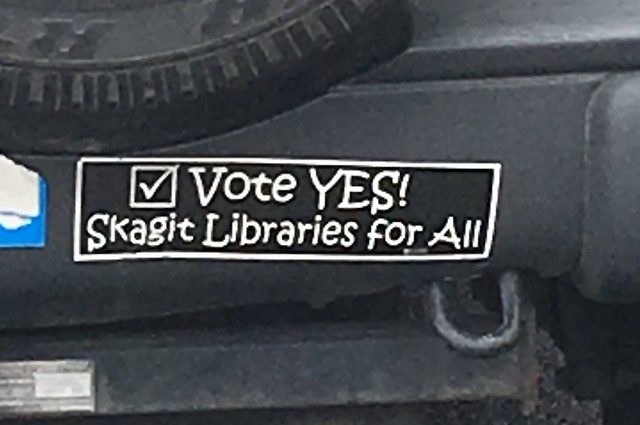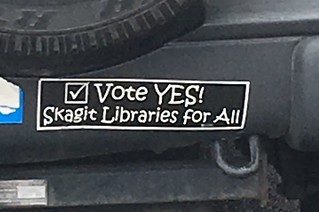Skagit Valley seems progressive compared to Greenville, but there are some areas where that’s not the case. One place switch taxation. They don’t have a state income tax, but instead, they have a very regressive, high sales tax. This shows up in the way services are provided (or not provided) to citizens.In Greenville County we take for granted curbside garbage and recycling pickup. Here it’s a paid service through Waste Management. I know that in South Carolina it varies county by county, but I’m not sure if this is a state-wide thing. Given the tax structure I think it might be.
The most egregious example is with libraries. There is no county-wide library system like there is in our state. In Greenville we have the main library in town with branches scattered throughout the county. In Skagit County this isn’t the case. Each municipality has its own library system. The towns of Sedro-Woolley, Burlington, and Mount Vernon are only a few miles apart from each other, but each has it’s own, distinct library system.
Getting a library card is free if you’re a resident of that town, but if you live in the county, you’re screwed. The cost for a non-resident is $30, according to our neighbor Linda. That can be a pretty high barrier for a poor rural family. Laura’s mom was appalled at the high price for non-residents, and wanted to set up a fund to provide free library cards for all kids that lived in the county. She would personally provide the funds. Sadly, the county couldn’t figure out how to do it because there is no coordination between these disparate systems.
I checked on neighboring Whatcom County. There are separate municipal systems, as with Skagit County, but there is also a county-wide system. The Whatcom County Library coordinates with the Bellingham Library, yet they are still separate systems.
To me this is just baffling. Yet, it fits with the funding structure for the state. It doesn’t seem like all residents are happy with this, though. The bumper sticker at the top of this post would bear that out. I haven’t been able to find out anything about a funding initiative, and I have no idea how old this bumper sticker may be. Given the age of the vehicle it couldn’t have been that long ago. It would be a great idea, but obviously it hasn’t happened yet.
Big disclaimer – I have yet to actually visit a library and find these things out for myself. This is how I found out about this weird configuration. One of the first things I like to do is visit the library to find out about the community. I couldn’t find out which one was THE library. Each town had its own. My plan is to visit each of these libraries to see if there is a difference in their offerings. We’ll see.
NOTE: I initially wrote this post using the Day One app that I mentioned yesterday. I used the “Share” feature to copy it to WordPress. It copied the text, but with no formatting. It didn’t copy the image. I had to post that from my phone to Flickr separately. Oh well. It’s still a good tool.


It looks like that campaign was started when one of the libraries wasn’t even going to allow non-residents of the city to pay for a card in 2004. http://old.seattletimes.com/html/localnews/2002053425_library04m.html and
http://www.seattletimes.com/seattle-news/skagit-county-library-measure-loses-again/
Sadly, it’s far from abnormal. I thought it was odd here in Macomb County, Michigan that it works much the same – each town has their own library. There are a handful that are a couple of townships together, and they have a coop where you can request books from one library to be sent to your library. Some will sell you a “non resident card,” but for $200 each, I doubt they are selling that many.
The county south of us dissolved their county library system in 2015.
When people think that they are “reading” because they are playing with social media on Facebook, they can’t comprehend actually going to a library to actually read, much less paying for the ability for children (that aren’t related to them) to go do the same.
Even though it seems odd to my experience, I was afraid this would be the case in other parts of the country. I guess it just strikes me as odd that it would happen, here, where things seem so progressive.
$200 for a library card is the “I don’t want to deal with it” price. That’s ridiculous.
Thanks for the link, BTW.